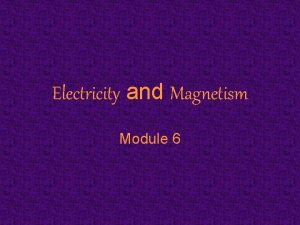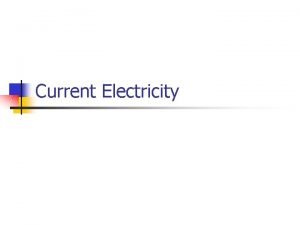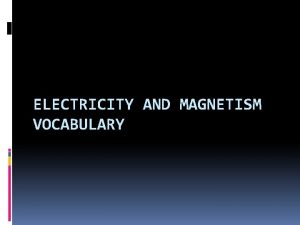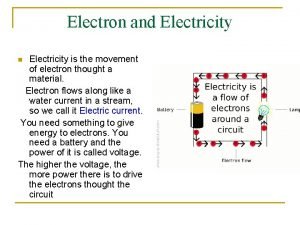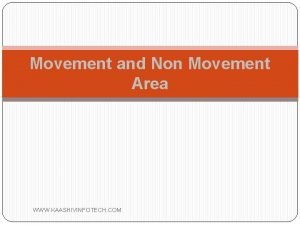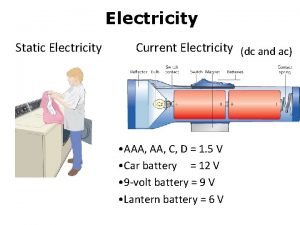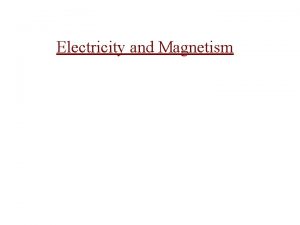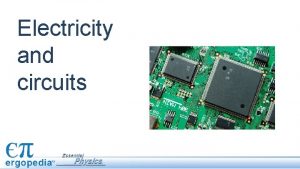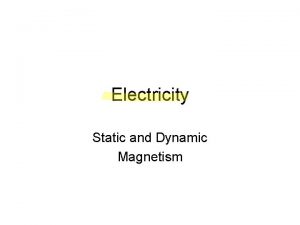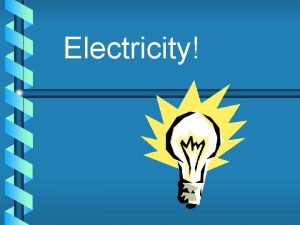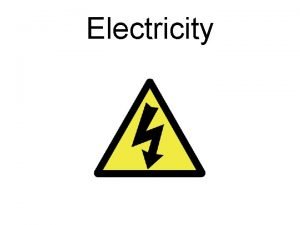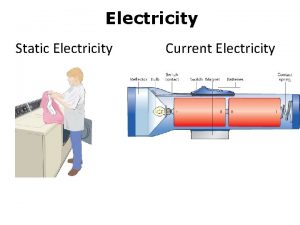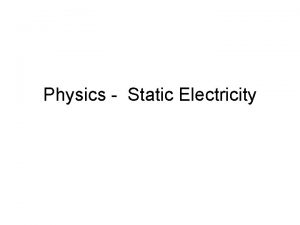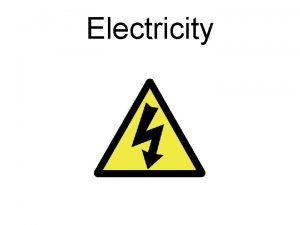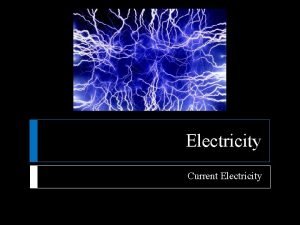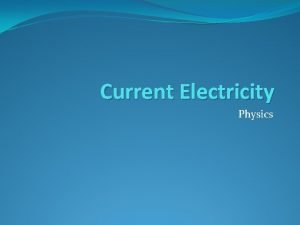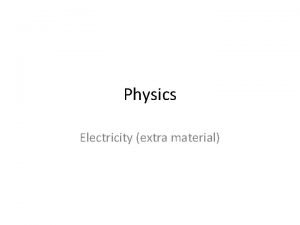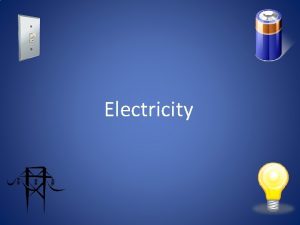Electron and Electricity is the movement of electron




















- Slides: 20

Electron and Electricity is the movement of electron thought a material. Electron flows along like a water current in a stream, so we call it Electric current. You need something to give energy to electrons. You need a battery and the power of it is called voltage. The higher the voltage, the more power there is to drive the electrons thought the circuit n

Electron and Electricity n n Voltage is like the Steepness of a river. The bigger the different in height between the start and the end of the river, the faster the water current will flow. Voltage is measured in Volts

Electrical Resistance n n Materials such as copper or aluminium metals that conduct electricity are called conductors. Materials that don't allow electrons to pass through them, such as rubber and plastic, are called insulators. Resistance is a measure of How an object opposes the passage of electrons. The unit of electrical resistance is the ohm.

Electrical Resistance Every materials has Resistance. Copper has a low resistance and the wood has a high resistance. For example, a meter of copper has only 1 Ohm but a meter of wood has 10000000 ohm We need resistance to reduce the flow of electrons thought a circuit, so we can build resistor to behave as Electrical resistance. n

Reading Resistor Values n n The resistance of resistors is indicated using colour-coded bands on the body of the resistor The first three coloured indicates the value of the resistor in Ohms. The first band tells us the first digit, the second band tell us the second digit and the third band tell us the number of zeros

Color Code Table

Examples n n A) If the first band is green (5) the second digit is blue (6) and the third band is orange (3), the value of the resistor is 56000 ohm. Because 1000 Ohm = 1 K, we have 56 k B) red, yellow. So we have 2, 2, 0000 or 220. 000 Ohm

Exercises n n n n 1. What resistor values are indicated by the following colour bands? (A) red, black, red (B) grey, red, orange (C) orange, white, blue (D) green, white, black 2. What are the colour codes for the following resistance values? (A) 2. 2 k (B) 270 (C) 56 k 3. What are the maximum and minimum values of a resistor with the following colours: Red, orange, brown with a gold tolerance band

Ohm´s Law n n There is a relationship between Voltage, Current and resistance. The current in a circuit ( amp) is directly proportional to the applied potential difference (volts) and inversely proportional to the resistance of the circuit ( resistance). n I = v/r

Ohm´s Law n A nine volt battery supplies power to bulb with a resistance of 18 ohms. How much current is flowing through the bulb? Solution: Substitute in the values for V(Voltage) and R(Resistance). n n I = v/r

Problem 1 A 110 volt wall outlet supplies power to a Tv set with a resistance of 2200 ohms. How much current is flowing through the Tv?

Problem 2 A CD player with a resistance of 40 ohms has a current of 0. 1 amps flowing through it. Calculate how many volts supply the CD player? Choose your answer below n n 10. 0 volts 0. 0025 volts 400. 0 volts 4. 0 volts

Designing a resistor network n Sometimes you need a kind of resistor, but you don't have it on hand it doesn't exist. Fortunately, it's possible to use several different resistors in combination to get virtually any level of resistance, for example if you have 2 resistor of 20 Ohm and you need a resistor of 40 Ohm, just add both in serial , so Rt = R 1 + R 2 + ……… ( Serial )

Designing a resistor network n n In the Figure you can see three resistors, but this time they're connected in parallel. Each electron will flow through one of the three resistors. This three resistor have a equivalent resistor of:

A Easier Serial Formula n n The formula is a bit difficult to remember, So could we find something easier? Yes, come on… try on

A Easier Serial Formula

Electron and Electricity n n In this circuit, calculate: A) the total resistance in the circuit? (B) the total current flowing at point A?

Electron and Electricity n n n This is a circuit the resistors are in parallel: n Calculate: A) the total resistance in the circuit? (B) the total current flowing at point B and the current at C and D?

Electron and Electricity n n In this circuit, calculate: A) the total resistance in the circuit? (B) the total current flowing at point A?

 Static electricity and current electricity
Static electricity and current electricity Static electricity and current electricity
Static electricity and current electricity Magnetism vocabulary
Magnetism vocabulary Movement of electricity
Movement of electricity Movement vs non movement area
Movement vs non movement area What is locomotor movement in dance
What is locomotor movement in dance Hát kết hợp bộ gõ cơ thể
Hát kết hợp bộ gõ cơ thể Frameset trong html5
Frameset trong html5 Bổ thể
Bổ thể Tỉ lệ cơ thể trẻ em
Tỉ lệ cơ thể trẻ em Chó sói
Chó sói Tư thế worm breton
Tư thế worm breton Bài hát chúa yêu trần thế alleluia
Bài hát chúa yêu trần thế alleluia Các môn thể thao bắt đầu bằng tiếng đua
Các môn thể thao bắt đầu bằng tiếng đua Thế nào là hệ số cao nhất
Thế nào là hệ số cao nhất Các châu lục và đại dương trên thế giới
Các châu lục và đại dương trên thế giới Công thức tính độ biến thiên đông lượng
Công thức tính độ biến thiên đông lượng Trời xanh đây là của chúng ta thể thơ
Trời xanh đây là của chúng ta thể thơ Cách giải mật thư tọa độ
Cách giải mật thư tọa độ Làm thế nào để 102-1=99
Làm thế nào để 102-1=99 độ dài liên kết
độ dài liên kết
